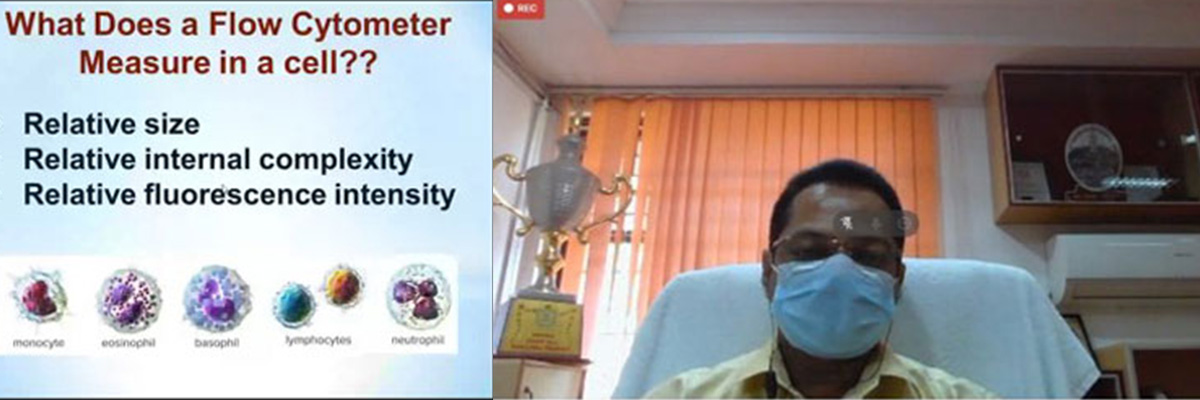
The Department of Microbiology, Nehru Arts and Science College has organized DBT – STAR college scheme sponsored National webinar on “Flow Cytometer and Applications in Medical Science” on 18/01/2021. The program was inaugurated with the welcome address by Dr. R. Vijayaraghavan, Head of the Department, Department of Microbiology, NASC. The presidential address of the program was delivered by Dr. B. Anirudhan, Principal, Nehru Arts and Science College. Technical Session was initiated with the talk by Dr. Sonia Verma, Scientist I, Transplant Immunology and Immunogenetics, All India Institute of Medical Sciences, New Delhi. Following the technical session and presentation by the resource person, the session was concluded with a vote of thanks.
Flow cytometry is finding increasing use in routine clinical laboratories for the diagnosis, prognosis and monitoring of disease. As the name implies, flow cytometry is the measurement of cells in a flow system, which delivers the cells singly past a point of measurement. In theory, there are many types of measurements that could be made but, in practice, the name refers to instruments in which light is focused at the point of measurement. The scattered light and fluorescence of different wavelengths are then recorded. Typically, light scatter at two different angles and from one to six or more fluorescences will be measured. Although cells (mammalian, plant, algae, yeast, bacteria) are usually analysed, other particles, such as nuclei, chromosomes or small beads, can also be studied. Flow cytometry is routinely used in basic research, clinical practice, and clinical trials. Uses for flow cytometry include: Analysis of leukaemias and lymphomas, detection of minimal residual disease, stem cell enumeration, solid organ transplantation, postoperative monitoring, detection of autoantibodies, HIV infection, Foeto-maternal haemorrhage, immunodeficiency diseases, paroxysmal nocturnal haemoglobinuria, reticulocyte analysis, measurements on red blood cells, and platelet counting and function.
The outcome of the Event
Flow cytometry is an important analytical tool that has moved from research to the clinical laboratory in the past 20 years. Although still important in research, many applications have become routine clinical tests required for diagnosis, estimation of prognosis, and monitoring of treatment. In addition, new applications, such as minimal residual disease detection and multiple-drug resistance monitoring, are being evaluated for clinical testing.
Flow cytometry is a powerful tool with many applications in pathology. Although it is currently used for many standard tests, new applications are continually being developed, including assays for minimal residual disease detection and multiple drug resistance assessment. As a tool, flow cytometry does not stand alone but enhances other methods, from morphologic to molecular analysis. Thus learning this advanced technology was the need of the hour for the audience. The speaker interacted with the audience and answered all their queries and touched about all the research opportunities of this new technology.